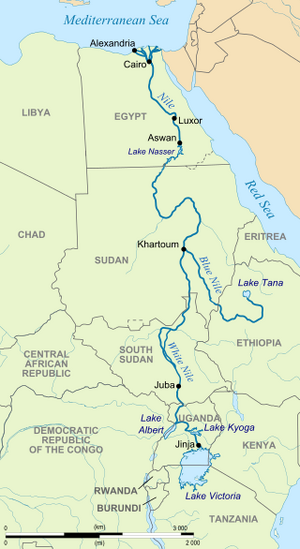Alexandria Egypt
- This article is for Alexandria (Egypt). For other cities of this name see - Alexandria (disambiguation)

Alexandria (Arabic: الإسكندرية Hindi: सिकन्दरिया) is a city in Egypt.
Variants
- Yavanapura (यवनपुर) (AS, p.770)
Founder
Alexandria was founded around a small pharaonic town c. 331 BC by Alexander the Great in Egypt.[1]
Location
It is along the coast of the Mediterranean Sea in the north central part of the country.
Foundation of Alexandria
Arrian [2] writes that ....Alexander now led his army into Egypt, whither he had set out at first (from Tyre); and marching from Gaza, on the seventh day he arrived at Pelusium in Egypt. His fleet coasted along also from Phoenicia to Egypt; and he found the ships already moored at Pelusium.2 When Mazaces the Persian, whom Darius had appointed viceroy of Egypt, ascertained how the battle at Issus had resulted, that Darius had fled in disgraceful flight, and that Phoenicia, Syria, and most of Arabia were already in Alexander’s possession, as he had no Persian force with which he could offer resistance, he admitted Alexander into the cities and the country in a friendly way.4 Alexander introduced a garrison into Pelusium, and ordering the men in the ships to sail up the river as far as the city of Memphis,1 he went in person towards Heliopolis,2 having the river Nile on his right. He reached that city through the desert, after getting possession of all the places on the march through the voluntary surrender of the inhabitants. Thence he crossed the stream and came to Memphis where he offered sacrifice to Apis and the other gods, and celebrated a gymnastic and musical contest, the most distinguished artists in these matters coming to him from Greece. From Memphis he sailed down the river towards the sea, embarking the shield-bearing guards, the archers, the Agrianians, and of the cavalry the royal squadron of the Companions. Coming to Canobus,1 he sailed round the Marian lake,2 and disembarked where now is situated the city of Alexandria, which takes its name from him. The position seemed to him a very fine one in which to found a city, and he thought that it would become a prosperous one.3 Therefore he was seized by an ardent desire to undertake the enterprise, and he marked out the boundaries for the city himself, pointing out the place where the market place was to be constructed, where the temples were to be built, stating how many there were to be, and to what Grecian gods they were to be dedicated, and specially marking a spot for a temple to the Egyptian Isis.4 He also pointed out where the wall was to be carried round it. In regard to these matters he offered sacrifice, and the victims appeared favourable.
History
Alexandria became an important centre of the Hellenistic civilization and remained the capital of Hellenistic and Roman & Byzantine Egypt for almost one thousand years until the Muslim conquest of Egypt in AD 641, when a new capital was founded at Fustat (later absorbed into Cairo).
Hellenistic Alexandria was best known for the Lighthouse of Alexandria (Pharos), one of the Seven Wonders of the Ancient World; its Great Library (the largest in the ancient world; now replaced by a modern one); and the Necropolis, one of the Seven Wonders of the Middle Ages.
Ongoing maritime archaeology in the harbor of Alexandria, which began in 1994, is revealing details of Alexandria both before the arrival of Alexander, when a city named Rhacotis existed there, and during the Ptolemaic dynasty.

